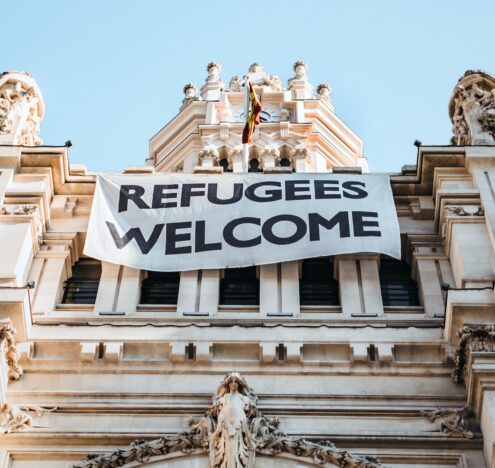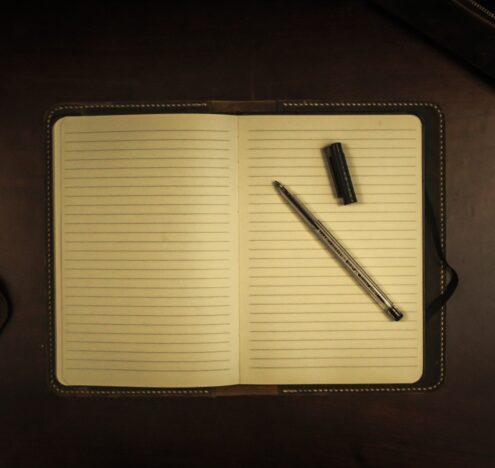I’ve always been told I’m too sensitive — I feel too deeply, cry too easily, and lead with my heart too frequently. “Think about things logically” is a refrain that I am all too familiar with; a phrase that, despite its best efforts, failed to dismantle my seemingly “fragile” disposition. As a child, the fragility of my emotional state seemed to coincide with whatever disastrous event Western media decided was important enough to cover that day.
During the PBS Newshour, while my father groaned about political ineptitude and my mother contemplated US governmental structures, I sat in between them, eyes glued to fiery images of despair and death, with tears streaming down my face. I couldn’t understand much of the expert commentary, but what I did perceive was the emotion; the interviewee’s sigh of exhaustion, the anchor’s empathetic and emphatic pause in between sentences, the soft shuffle of microphone static as the field journalist nervously attempted to capture broad strokes within a two-minute timeframe. It was almost as if my body understood things that my brain could not. No words were needed to convey the gravity of the circumstances that confronted the human beings depicted on screen. I knew (or rather, my subconscious knew) that I needed to do something. Anything, really, to expel these emotions and put them to productive use.
In high school, I engaged in activities like peer leadership and peer mediation, perhaps in a futile attempt to control the emotions that often overpowered me — to channel my big feelings into something positive instead of wallowing in them. By the time college rolled around, I was knee-deep in applications for internships at think tanks, academic research institutions, and other human rights-oriented organizations. Little did I know I’d wind up falling into a career connected to dismantling weapons of mass destruction threats, countering violent extremism, and understanding the ever-complicated dynamics of disinformation campaigns. Most of these security issues were completely incomprehensible to me four years ago. I had never heard of, nor had anyone ever told me about career opportunities in this field. In fact, I didn’t even know these types of jobs existed. So much of the language, the acronyms, and the attitudes seemed entirely out of reach for someone like me; someone who cries at the news and inherently thinks of human impact over geopolitical strategy.
My weaving of human rights with that of hard security policy seems to be met with figurative (sometimes literal) eye-rolls and belittling silence. If it were socially acceptable, I imagine some people would lament, “Ah, there she goes again.”
Most of my childhood friends and family seemed surprised yet intrigued by my interests. Many assumed I’d pivot to work in international development after a year or two of exploring a male-dominated world with harsh realities and obfuscated job descriptions. But for some reason, there was something that compelled me to continually pursue opportunities that seemed out of sync with my perceived delicate sensibility, my sing-songy voice, and my hyper-fixation on politeness, even if it meant dismantling my actual opinions. To say that I’ve found myself in the national security field is probably a stretch, but it’s certainly helped me uncover facets of my personality and have allowed me to become more assertive. The Leela of three years ago is definitely not the same version writing this piece today.
Self-discovery, nonetheless, I have struggled with, and continue to endure, the weight of others’ perceptions of my personhood in this industry. I entered my very first nonproliferation internship with merely an “Introduction to International Relations” course under my belt and a slew of Italian language courses. My peers, many of whom were a year older, seemed far more sophisticated and adept at understanding the lectures and guidance we were made privy to. As I struggled to keep up with all of the information overloading my brain, taking diligent notes to recall key statistics I knew I’d forget, my fellow interns seemed to pity me. I wasn’t given much work to do, and my comments were frequently ignored, perhaps overshadowed by my presumed soft-spokenness and emotional responses to truly frightening national security challenges.
I’ve noticed a similar phenomenon as I’ve transitioned to full-time work over the last couple of years. Although I feel more generally capable and confident in my knowledge and opinions, my weaving of human rights with that of hard security policy seems to be met with figurative (sometimes literal) eye-rolls and belittling silence. If it were socially acceptable, I imagine some people would lament, “Ah, there she goes again.” When speaking up about inconsistencies in processes or sharing constructive criticism on workflows, I’ve previously been told that I “say the first thing that pops into my head.” I’ve even been laughed at for my age, supposedly indicating that I am seemingly not hardened nor resilient enough to realize that we can’t question bureaucracy.
CHOOSING EMPATHY
Truth be told, I’ve never quite understood the national security field’s emphasis on hardened dispositions and antiquated modes of solutioning. Logically, I can understand that bureaucracy doesn’t particularly lend itself well to change. From a personal, albeit emotional standpoint, the issues plaguing the security-defense apparatus disproportionately, if not entirely, have human consequences. While the issues we work on are intrinsically human-oriented, there is often little room for empathy and sensitivity.
More than this, these qualities seem to be looked down upon or deemed less than what we consider to be “conventional strengths” in the workplace. I frequently feel compelled to choose between adopting a perceived “tough” exterior or revealing my true, transparent emotions about the issues I care about. However, perhaps indicative of my inability to remove my heart from my sleeve, I’ve decided to pick transparency. My selection surely has professional repercussions. Those acting with transparency will more often than not receive negative attention for speaking up when situations or processes arise that they disagree with. In the past, making these choices has ostracized me in particularly male-dominated environments and iced me out of conversations that could’ve been well-suited to my development. Be that as it may, I don’t think I ever want to lose sight of what spurred my passion for security in the first place; crying during the PBS Newshour.
I often ask myself why I don’t work harder to present differently in the workplace. Honestly, I’m not quite sure. It doesn’t seem possible for me to respond to security issues any differently. My emotions always appear even when I desperately try to suppress them. If my emotions and sensitivity make me who I am, why can’t they be my strengths, too? In a fast-paced field with constant geopolitical turmoil, approaching harder security issues with a compassionate mindset helps us understand the individuals we are trying to serve. Acting with empathy allows us to contextualize and evolve our solutions to complex security challenges, many of which involve a variety of cultures, languages, and personalities.
From a geopolitical standpoint, our ability to mitigate and respond to potential security threats is essential; maintaining international stability and control when so much is at stake is necessary to protect political interests. However, when everyone behaves in the same way and focuses solely on productivity and efficiency for managing risk, we can quickly lose sight of our ultimate goal: to help human beings. After all, human impact is the ultimate, most significant, and detrimental consequence of the national security threats we all face.





















